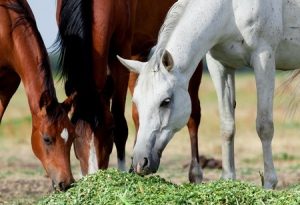 Equine nutrition is a complicated field that can lead to misconceptions about horse well-being. A proper diet is pivotal in maintaining a horse’s health and ensuring their strength, vitality, and overall happiness. Over the years, numerous myths have evolved, causing confusion and unintentional diet imbalances. This post aims to debunk some of the most prevalent myths and provide insights into what truly constitutes a balanced and beneficial diet for horses.
Equine nutrition is a complicated field that can lead to misconceptions about horse well-being. A proper diet is pivotal in maintaining a horse’s health and ensuring their strength, vitality, and overall happiness. Over the years, numerous myths have evolved, causing confusion and unintentional diet imbalances. This post aims to debunk some of the most prevalent myths and provide insights into what truly constitutes a balanced and beneficial diet for horses.
Myth 1: Horses Only Need Grass to Thrive
Grass is an essential part of a horse’s diet as it provides essential fiber. However, relying solely on grass may result in nutritional deficiencies as different types of grass offer varying levels of vitamins and minerals. While some horses can maintain their weight on pasture alone, others, especially those with high activity levels, may require additional feedings to meet their energy requirements.
Myth 2: Carrots and Apples Are Always Safe and Healthy Treats
Many horses enjoy eating fruits like apples and vegetables like carrots as treats. However, moderation is key. When given in excess, these treats contain sugars that can upset a horse’s dietary balance. It is important to note that treats like these can also pose a choking hazard. They should be given in appropriate sizes and moderation, as natural does not always mean safe.
Myth 3: Horses Should Be Fed Large Meals Once or Twice a Day
Horses, by nature, are continuous grazers. Their digestive systems are designed to process food in small amounts throughout the day. Feeding large meals once or twice daily can increase the risk of digestive problems, including colic. Spreading out feedings and allowing access to hay or pasture throughout the day aligns more naturally with a horse’s digestive physiology.
Myth 4: All Horses Require Grain in Their Diet
Grains are a crucial source of energy, especially for working horses. However, not all horses require grains. Sedentary horses or those on good pasture might receive sufficient nutrients without any grain. Overfeeding grain can lead to obesity and other metabolic problems. Therefore, it is important to consider individual needs and adjust grain inclusion accordingly, as with all components of a horse’s diet.
Myth 5: Supplements Are Essential for Every Horse
While supplements can fill in nutritional gaps, they aren’t universally necessary. The need for supplements varies based on diet, activity level, age, and health status. Blindly adding supplements can lead to nutrient imbalances. Before introducing any supplement, it’s crucial to assess its actual need, preferably with the guidance of an equine nutritionist or veterinarian.
Myth 6: Soaked Hay Loses Its Nutritional Value
Many horse owners soak hay to reduce dust or mitigate the risk of certain metabolic disorders. A common misconception is that soaking leaches out all the nutrients. While minimal water-soluble nutrients are lost, the overall nutritional value remains relatively intact. The benefits, especially for horses with respiratory issues or specific dietary needs, often outweigh the minor nutrient loss.
Equine nutrition is both an art and a science. What may work for one horse may not necessarily work for another. Therefore, treating each horse’s diet as unique is crucial, making decisions based on facts and not myths. Whether you are an experienced equestrian or a novice horse enthusiast, it is important to keep yourself well-informed and seek expert advice to ensure that you provide the best possible nutrition to your equine companion.
For those truly dedicated to the well-being of their horses, creating an optimal environment is just as crucial as nutrition. Consider a space that protects from the elements, ensures easy access to fresh food, and provides comfort after a long day. A custom horse barn or run-in shed from Deer Creek Structures can be the perfect solution!
Explore the endless possibilities and craft the perfect sanctuary for your horse by browsing our website or calling (254)546-2276 for more information on our products and services.
